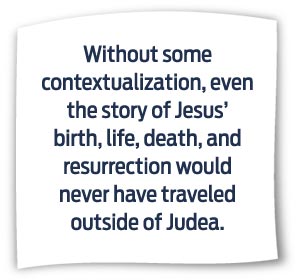
The Liverpool accent sounded decidedly strange in the shadowed early-morning cornfields of northern Indiana. I wondered for a moment if I had inadvertently bumped my rental car radio tuner and fallen on some Chicago rock station offering hits from the British “invasion” of the ’ 60s and ’ 70s.
But no, the tuner was unchanged, at least in numeric signal. The nasal, Harrisonesque voice on the Christian station wandered through a cleverly written promotion for “Let It Be Christmas,” a holiday musical produced by a 5,000-member nondenominational church just east of South Bend. I’ll admit to grinning in disbelief as I heard the final tagline for the upcoming show: The
Story of Christmas in the Music of the Beatles.
Now, I believe in Christian contextualization—of a kind. Chances are these words I am typing will end up—somewhere—being translated into French or Spanish or Swahili. That is a first and most basic kind of contextualization: a willingness to move the message into a medium in which it can be more fully understood by those who do not share my English-only handicap. Christian missiologists have correctly identified the vital role that appropriate contextualization plays in communicating the gospel to a world bristling with divisive differences in language, culture, politics, tribal allegiances, and income levels. Without some contextualization, even the story of Jesus’ birth, life, death, and resurrection would never have traveled outside of Judea. It would have remained only a novelty within Judaism instead of the world-circling faith it quickly became. The New Testament is, among other things, a casebook of the young Christian church working out what part of its message was essential and what was of somewhat lesser importance.
 That said, we are still a long distance from “the story of Christmas in the music of the Beatles.” The “Fab Four” from Liverpool may have achieved a pitch-perfect blend of syncretistic message and memorable tunes, but that hardly qualifies either the group or its music as preachers of the gospel, even though the band seemed to be all things to all people. Roman Catholics and Orthodox Christians found a kind of solace in the title lyric of the community church concert (“When I find myself in times of trouble, Mother Mary comes to me, speaking words of wisdom, let it be”), while devotees of Eastern faiths could embrace George Harrison’s “My Sweet Lord”—and its rhythmic murmuring of “Hm, my lord (hare krishna); My, my, my lord (hare krishna).” John Lennon’s frank atheism (“Imagine there’s no heaven, it’s easy if you try. No hell below us, above us only sky”) envisioned a world without religion, war, or poverty, in which “all the people [are] living for today”—a faithless pan-utopia.
That said, we are still a long distance from “the story of Christmas in the music of the Beatles.” The “Fab Four” from Liverpool may have achieved a pitch-perfect blend of syncretistic message and memorable tunes, but that hardly qualifies either the group or its music as preachers of the gospel, even though the band seemed to be all things to all people. Roman Catholics and Orthodox Christians found a kind of solace in the title lyric of the community church concert (“When I find myself in times of trouble, Mother Mary comes to me, speaking words of wisdom, let it be”), while devotees of Eastern faiths could embrace George Harrison’s “My Sweet Lord”—and its rhythmic murmuring of “Hm, my lord (hare krishna); My, my, my lord (hare krishna).” John Lennon’s frank atheism (“Imagine there’s no heaven, it’s easy if you try. No hell below us, above us only sky”) envisioned a world without religion, war, or poverty, in which “all the people [are] living for today”—a faithless pan-utopia.
Could this be, even in our most fevered imaginations, the crucial message that caused Jesus to leave heaven’s glory and become a human being?
Assuming, as I do, that the producers of the community church Christmas concert are serious about what they are presenting—and not simply having a good laugh at all the baby boomers who will line up to hear Beatles tunes in church—there are clearly some who believe so. They have decided that the Bible story of a poverty-stricken engaged couple, a miraculous birth, angel choirs, and shepherds is now inaccessible to secular Hoosiers, and must be updated to “urban London in the 1960s.”1
Distracted—and aren’t we all?—by the plastic Nativity scenes and the inflatable front yard reindeer, they have seized an indisputably powerful cultural idiom—the music of the Beatles—and glued a story about Jesus onto it.
This is (I predict) both wildly popular and desperately sad. At the heart of all such ill-advised contextualizations is a fundamental distrust that the story of Jesus maintains its inherent power to attract and command the attention of the men and women in every age. Plainly said, Jesus is not like Santa Claus or Paul McCartney, nor was He born simply to “take a sad song and make it better.”
“In him was life, and the life was the light of men. The light shines in the darkness, and the darkness has not overcome it” (John 1:4, 5, RSV). No star in the sky—or on stage, screen, LP, or CD—ever shone so brightly, nor ever will.
____________
1 http://letitbe.gccwiredblogs.com/the-story/
2 Bible texts credited to RSV are from the Revised Standard Version of the Bible, copyright © 1946, 1952, 1971, by the Division of Christian Education of the National Council of the Churches of Christ in the U.S.A. Used by permission.
__________________
Bill Knott is editor of the Adventist Review. This article was published December 22, 2011.